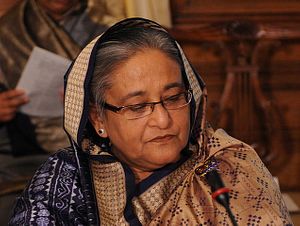On July 31, Bangladesh police did something they consider routine. They shot and killed someone in cold blood. But this time the target was not a political opponent or a “drug dealer.” Instead, it was a retired military officer who had once been a member of Prime Minister Sheikh Hasina’s own protection detail. Like thousands of others killed by Bangladesh’s feared security forces, Major Sinha Rashed Khan became yet another victim of extrajudicial execution by government security forces.
The killing was so brazen that the public response has been intense, forcing Hasina to finally reckon with a promise she broke long ago: Under her watch, she said, there would be “zero tolerance” for extrajudicial killings.
When I met Hasina in exile in her sister’s flat in London in 2008, she thanked me for standing up for rights in her country. She insisted that, if she won the following year’s election, she would end this practice, which she had bitterly criticized. “I will not let these killings happen. You can believe me,” she said.
Despite such promises, Bangladeshi security forces have allegedly extrajudicially killed over 2,400 people during her decade in power. No matter how appalling their claims, officials dismiss allegations with rote talking points: the victim was found dealing drugs, or was a violent criminal. Somehow one after another dies in what is euphemistically called “crossfire” — a staged gunfight in which security forces pretend to retaliate in self-defense.
The term “crossfire” is so commonly used that it has become a verb for killing by the authorities. Earlier this year lawmakers, including some in the ruling party, openly called for alleged criminals to be “crossfired.”
After the killing of Major Sinha, police defaulted to their usual line: drugs had been recovered from his vehicle and Sinha had aimed a gun at the police, so they shot him in self defense. But the web of lies unraveled quickly. The authorities were forced to open an investigation, which thus far has resulted in the suspension of 21 police officers, seven arrests and warrants against two others. The government has even held a public hearing that drew crowds eager to know whether this time justice would be upheld.
Unfortunately, the sincerity of the investigation is undermined by the appointment of the national police chief, Benazir Ahmed, to co-lead it. Ahmed was recently promoted after years at the helm of the notorious Rapid Action Battalion (RAB), a paramilitary unit comprised of both police and seconded military personnel. During his tenure alone, RAB forces carried out at least 80 enforced disappearances and over 450 extrajudicial killings.
In April 2017, while Ahmed was in charge, Swedish Radio reported on a secretly recorded interview with a senior RAB officer who admitted that the force routinely picked up people, killed them, and disposed of the bodies. In 2018 the family of a local Awami League politician, Akramul Haque, listened over the phone as Haque was allegedly shot to death. In the recordings released by the family one can hear directions being given: “Take out the bullets,” one person said. “Have his hands been untied?” asks another. But RAB says Haque was killed in a gunfight as part of Hasina’s bloody “war on drugs,” which Ahmed helped lead.
Human Rights Watch has long called for disbanding RAB. The UN Committee against Torture has called upon the Bangladesh government to, at the very least, make RAB a purely civilian force.
One of our main fears when RAB was created was that the cross-pollination of soldiers and cops through RAB would mean that these abusive practices could easily bleed into the police. Now this fear has been realized. Ahmed’s promotion was part of a pattern in which those who have proven their willingness to oversee abuses in the name of the ruling party are promoted and rewarded. One of the senior police officers suspended following Major Sinha’s murder had been widely known for the spike in extrajudicial killings. Yet last year this officer was awarded the prestigious police medal after he reportedly boasted of killing “drug dealers” in “gunfights.” A couple of months later he openly admitted to being involved in intentional “crossfire” killings, saying that his team “only targeted criminals.”
But the Sinha killing has shown that political control of the security forces is possible. Since arrest warrants were issued on August 5, there hasn’t been a single “crossfire” reported in Bangladesh.
Sheikh Hasina, who has long claimed to be a champion of democracy and human rights, should use this occasion to try to find the person who in 2008 looked me in the eye and promised to end illegal killings and torture. She should dismiss all those credibly alleged to have been involved in crossfire killings and create an independent commission to investigate all alleged extrajudicial executions, and hold those responsible to account. Only then will she start to keep her promise of zero tolerance.
Brad Adams is Asia director at Human Rights Watch.

































